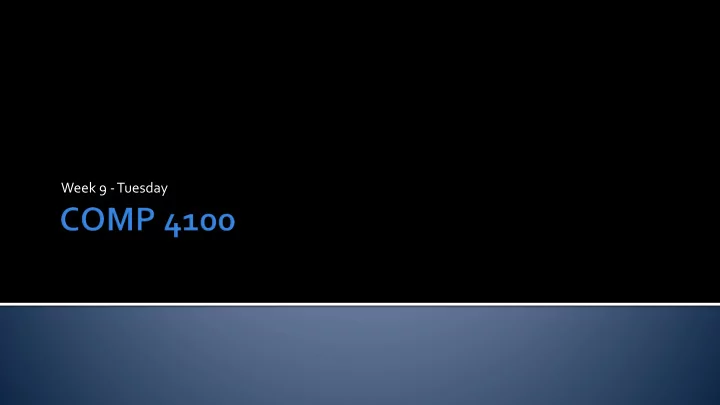

Week 9 -Tuesday
Why do we write? Why do grammar and spelling matter? Why do citations matter?
Many papers still had comma splices and sentence fragments See earlier slides or come talk to me for help on those Many papers contained contractions Many papers contained repetitive statements, either grouped together or sprinkled throughout Once a person has been introduced, a standard practice is to refer to that person, especially the subject of a paper, by his or her last name: "Samuel L. Jackson is an actor famous for playing violent roles. Jackson graduated from Morehouse College in 1972." However, it is also acceptable to use the pronouns "he" or "she" for variety when the antecedent is clear
This problem was so common that it deserves its own slide The pronoun "this" allows writing to be vague and confusing: "These assassinations were commissioned by the rich. This left millions of poor people fearing for their lives." What does "this" refer to? Better: "These assassinations were commissioned by the rich. This unequal access to justice left millions of poor people fearing for their lives."
The pronoun "it" has the same problem: Darth Revan forced his apprentice to wait three days in the snow before granting him an audience. It was a symbolic act. What is the symbolic act? Forcing him to wait? The fact that it was in the snow? The audience itself? Better: Darth Revan forced his apprentice to wait three days in the snow before granting him an audience. This humiliation was a symbolic act. Guidelines: Always put a noun after "this" Never use "it" unless it's crystal clear what "it" refers to Never use "it" or "this" as the subject of a sentence
Students have a terrible temptation to write words that sound fancy: besought athwart elucidate etc. Or overly complicated: "The differences in banking technology and sophistication in both countries are miles apart in advancement." Better: "England has a more advanced banking system than Bolivia."
A strong research paper supports every piece of information that isn't common knowledge with a citation: These robots are able to kill hundreds of snakes every minute (citation). The support is not necessarily made stronger by using direct quotes: "After tabulating data for hours, our lab is able to report that the VX98 tyranobots kill three to five snakes per second" (citation). The paraphrase is simpler and likely contains all the information the reader needs Only use direct quotes when there is special value in the exact wording Never butcher the grammar of your own sentences to shoehorn in a direct quote
The two main citation styles are MLA and APA I don't care which you use, as long as you're consistent MLA requires author and, if available, page number, using the smallest amount of information needed to identify the source from your works cited APA requires author and year but only requires page numbers for direct quotes (still encouraging for paraphrases) In either case, there is no need to repeat information (like the name of the author) in the citation if it's already in the sentence
The period ending your sentence always goes after the citation Many students got this wrong Paraphrase (MLA): Dillon Beresford was interested in the damage Stuxnet could do with PLCs (Zetter 144). Paraphrase (APA): Dillon Beresford was interested in the damage Stuxnet could do with PLCs (Zetter, 2014). Direct quote (MLA): "The news in August 2010 that Stuxnet was sabotaging Siemens PLCs caught the interest of a twenty-five-year-old computer security researcher in Austin, Texas, named Dillon Beresford" (Zetter 144). Direct quote (APA): "The news in August 2010 that Stuxnet was sabotaging Siemens PLCs caught the interest of a twenty-five-year-old computer security researcher in Austin, Texas, named Dillon Beresford" (Zetter, 2014, p. 144).
For both MLA and APA, alphabetize by the last name of the first author Use the title if there is no author Put last names first but don't change the ordering of other items that are not the names of people Indent all lines after the first line, a hanging indent Word can do this automatically for you There are many details: Read MLA or APA references and look at examples
There are many online references for APA, but here is one from my alma mater, Purdue: https://owl.purdue.edu/owl/research_and_citation/apa_style/apa_fo rmatting_and_style_guide/general_format.html And one for MLA: https://owl.purdue.edu/owl/research_and_citation/mla_style/mla_fo rmatting_and_style_guide/mla_general_format.html And other reference for MLA, maintained by Cornell: https://www.library.cornell.edu/sites/default/files/mla_style_revised. pdf
I'll meet with each group on Tuesday so that we can plan what we want to get done by Thursday On Thursday, you'll show me what you got done It's fine if you miss deadlines, but the planning is important Update your Trello accordingly
Project 3, the initial implementation and unit testing, is due Friday, March 22 Assignment 5, the final draft for your papers, is due Friday, March 29
Recommend
More recommend